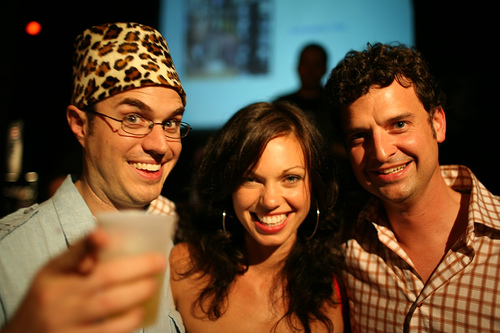 If you’d asked Jeff Macpherson about “Tiki Bar TV” 3 years ago, he would probably tell you that it is just something he and his friends do for fun–a creative way to kill time with friends on a Friday night. While he was a pioneer in the world of Video Podcasts, even Jeff would have been skeptical at the possibility of Tiki Bar TV becoming a full time gig.
If you’d asked Jeff Macpherson about “Tiki Bar TV” 3 years ago, he would probably tell you that it is just something he and his friends do for fun–a creative way to kill time with friends on a Friday night. While he was a pioneer in the world of Video Podcasts, even Jeff would have been skeptical at the possibility of Tiki Bar TV becoming a full time gig.
3 Years later, TBTV is consistently one of the top video podcasts (if you don’t believe me, just go to the iTunes video podcast directory and click on “Comedy”), and has been for sometime. While they are wholly an independent production earning a living from selling merchandise, and only recently acquiring some sponsorship, they are ranked among other top podcasts from Comedy Central, G4, and other network backed shows. I recently got the chance to pick the brain of the good doctor, in hopes of finding out the right prescription, for success as an independent content producer.
Note: my questions and Jeff’s answers are slightly paraphrased–to listen to our entire conversation click the link at the bottom of the page.
What has made Tiki Bar TV such a success?
Craig Key: TBTV is as very home grown and independent as they come. What do you think has made the show a success?
Dr. Tiki: We’ve been really fortunate. I think it helped that we were among the first video podcasts. I recently met Steve Garfield who was probably the first video podcaster. We determined that at the time we started there were 20 others–not really going under the name “video podcasts,” they were calling themselves “video blogs” and they had RSS feeds. But when I saw there were video blogs out there, and I thought to myself “We can make a show, and it will be pretty easy…if we add music we’re the most show-like video podcast out there.”
I remember talking with Johnny Johnny when we were making first episode “Margaritaville.” I asked: “What are we going to call this thing?” and he didn’t know. I said “Let’s call it a video podcast,” and he said “There’s no such thing!” I remember that moment, I’m going “Well Cool! Then we’ll stand out!” At that time I thought that we might have 500 people watching this show, like the viewers were in on this joke, that it was an inside joke. It was very obviously a home-made show, and that the viewers would write in, and we’re all just pretending it’s a real show
ck: Certainly your show started with humble roots (home-made, shot on a handi-cam, no lights, etc), but it seems like your show, and in fact podcasting in general has grown up over the last 3 years and your production values are now very strong.
DrT: The production values have gone up over the last 3 years. We now have 35 episodes in the can, and one might think that it’s because we learned to be filmmakers. That’s actually not the case, we were filmmakers before, but we’ve started to put more effort into it. The audience went up, but some people actually prefer the “classic” episodes, the more rough around the edges feel, and I completely understand that. At the same time, I always prefer a more polished product, but it’s the very nature of the show to be unpolished. You can get very polished stuff on Television; why would you spend your time hunting the web for that?
Advice for other podcasters
ck: What advice would you give for start up podcasters with a camera, a mic, and a basement?
DrT: You’re going to have to love it. Because it’s not going to pay anything–I promise you, it will not pay you–not for a while. So you’ve really got to love the subject matter, and what you’re trying to do. If you’re doing it just for recognition, it’s probably not going to work.
 I would also suggest getting 3 or 4 episodes done, before you post it, and start telling everyone about it. One episode is not a series, and it’s common for people to get two episodes done and then stop. Half of them will regroup later and start making the show again, but you have a disadvantage when trying to publicize it, because people have already heard of your show, and they are probably not going to come back a second time. It’s called “spending your press” in regular media.
I would also suggest getting 3 or 4 episodes done, before you post it, and start telling everyone about it. One episode is not a series, and it’s common for people to get two episodes done and then stop. Half of them will regroup later and start making the show again, but you have a disadvantage when trying to publicize it, because people have already heard of your show, and they are probably not going to come back a second time. It’s called “spending your press” in regular media.
My other thought, is this: At first being on the internet was so liberating, we broke a lot of rules, and taboos making the show. Now, I know that our audience has grown, andfamily and friends are watching. You try to block that out of your mind, but that the same time you’re thinking “I cannot really use the ‘c’ word, when I know my Aunt is looking at it and thinking, This guy had such a promising career in the film business, and now he’s on the internet, banging around crude words.At first we used pseudonyms, because we didn’t want anyone in the film industry to see that we were making this absurd, low-rent show on the web. Ironically, the most attention–sort of our breakout work is this web show!
Tiki Bar TV & 5 Alarm Music
ck: How do you feel about the way I web-stalked Johnny Johnny to reach out to do business with you?
DrT: That’s great! We get a lot of people reaching out to do business, and it’s difficult to tell one from another. Sometimes a really big deal might come from a simple, one line “Hey you guys are great, I’d like to work with you.” We actually followed up on one recently, and it turned out to be a major big wig! Others have written long elaborate note bragging about themselves, and they turned out to be kind of a shyster. So it’s difficult to tell at times, but it’s a high class problem to have. I wish this problem on podcasters, I really do!
But I have to say this, our relationship with 5 Alarm Music has been really terrific. You have obligations to your artists, and your company, and we’re such a small entity with a very obvious need for music. We really score our show, and build each scene using your library. And it’s tricky because we’re really only going for 50’s cocktail lounge music. Cheesy–in fact certain cues are just outright stupid, and they are made to undercut anything in the scene. If the scene is serious, or straightforward, the music will be intentionally ruining the moment.
Because we improvise the show, and it takes place in literally a 400 square ft environment, there is not much we can do physically or visually in terms of blocking. I rely heavily on the music, and our color timing. Music is a major key. If I pulled the music out, it looks like one totally random, unending sketch. And the moment that I take two guys out of one scene, and put them in another with a blue tint, crickets, and maybe a xylophone track, it feels suddenly feels like a new scene.
ck: Kudos back at you! Your use of our music is so much fun to watch. You really dig deep to find some fun tracks, or often the tracks that we wish someone would use, but no one ever does.
DrT: I’m really glad you guys like that. I guess you can see my sense of humor as well by what music I’m going for. When I’m listening to the track, I actually really do burst out laughing–some people think I’m crazy. I actually love some of the 80s, corporate, motivational tracks. I try to get into the mind of the person who wrote it, or uses it. It’s actually now like “vintage” corporate inspirational tunes. You couldn’t even hire someone to write tracks like that anymore! I’m really hoping to create another show that will pull on some of those 80s cheesy tracks to use, because they are so awesome, they’re so funny!
ck: give me call when you’re ready. I’ll dig deep to choose the cheesiest tracks for the show!
To hear the entire conversation with Dr Tiki, click below. You’ll hear Jeff talk about everything from HD work flow to his love for the “learnstitute,” and our speculations on the future of media and content distribution.

